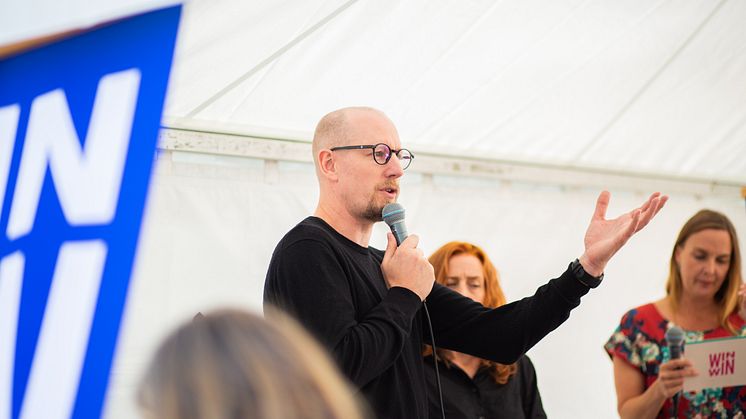
Blogginlägg -
Trailblazing Leadership in the Digital Age: Safeguarding Democracy & Resilience
Our societies have never been more connected—or more vulnerable. As digital infrastructures become the backbone of democracies, they are also prime targets for cyberattacks, misinformation, and geopolitical influence. The war in Ukraine has made it painfully clear: digital resilience is no longer optional. It is the difference between a functioning society and chaos in times of crisis.
So how do we safeguard our democracies, protect critical infrastructure, and ensure that our societies remain free and open in a time of increasing digital threats?
To address these challenges, we spoke with Carl Heath, senior researcher at RISE Research Institutes of Sweden, member of the WIN WIN Gothenburg Sustainability Award jury and a leading voice in digital resilience. His insights shed light on the crucial steps organisations and governments must take to build robust, future-proof societies.
Q: How do you define digital resilience, and why is it essential for societies and organisations to strengthen their capabilities in this area?
Digital resilience refers to the ability to withstand, recover from, and adapt to digital disruptions—whether stemming from disinformation, hybrid threats, cyberattacks, technical failures, or political pressure—across periods of peace, crisis, and conflict.
Strengthening digital resilience is imperative as modern societies and democracies are increasingly reliant on digital infrastructure, much of which is controlled by a small number of dominant players, primarily large American and Chinese technology firms. This dependency creates vulnerabilities that can be exploited by hostile actors, posing significant risks to both democratic institutions and national security.
The war in Ukraine has starkly illustrated how digital resilience can determine whether a society continues to function under duress or descends into instability.
In an era where authoritarian influences are expanding—even within established democracies—digital sovereignty is becoming a critical prerequisite for safeguarding democratic processes and essential societal functions.
Q: The world is undergoing profound geopolitical shifts, marked by increasing uncertainty. What kind of leadership is required to foster unity, adopt a long-term perspective, and actively contribute to a more sustainable and just future?
Forward-thinking leadership must recognise that the rules-based global order is evolving, with traditional alliances and geopolitical certainties no longer guaranteed. Effective leaders must have the courage to navigate this new reality, prioritising resilience, sustainability, and strategic autonomy over short-term economic gains. At the same time, they must foster cross-border collaboration to develop sustainable solutions that extend beyond national interests.
Today’s leaders must strike a careful balance between openness and strategic independence—advocating not for isolationism, but for the ability to operate autonomously where necessary.
Both public and private sectors must work together to build physical and digital infrastructures that uphold democratic values while ensuring long-term security and stability. Just as past generations invested in transformative infrastructure projects such as railways and electricity grids, today’s leadership must mobilise resources to make critical investments in secure and resilient digital systems.
To be effective, modern leadership must be both principled in its commitment to democratic values and pragmatic in its approach to implementation.
Q: What concrete advice would you give today’s leaders for navigating this new reality?
1️⃣ Invest in open digital infrastructure – Prioritise open protocols, open-source technology, and European alternatives for critical systems. Public procurement should be used strategically to strengthen European digital ecosystems.
2️⃣ Prepare for digital crises – What happens if major US tech services suddenly shut down in Europe? Governments and organisations need contingency plans now, rather than reacting when it’s too late.
3️⃣ Strengthen education and expertise – A thriving knowledge society is essential for democracies in a digital age. Europe must invest in the skills and knowledge needed to develop secure, independent digital solutions.
4️⃣ Build international alliances – Beyond the US and EU, partnerships with like-minded democracies worldwide will be crucial for a sustainable digital future.
5️⃣ Counter misinformation and influence operations – Strengthening media literacy and regulating digital platforms will be key to protecting democratic discourse.
The time to act is now - while Europe still has room for strategic manoeuvring - rather than waiting for a crisis to dictate reactive measures.
Curios to learn more? Carl Heath will be leading the panel discussion "Leading in uncertain Times – Insights from a changing world" at the Gothenburg Sustainability Summit April 9th.
